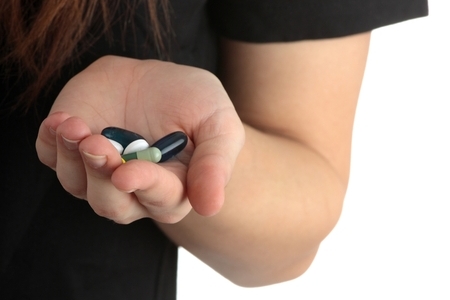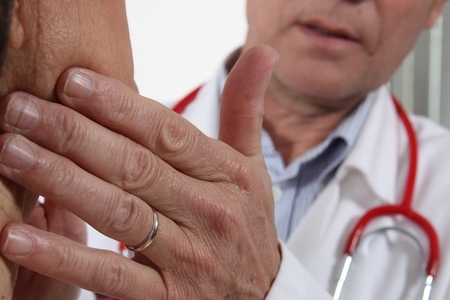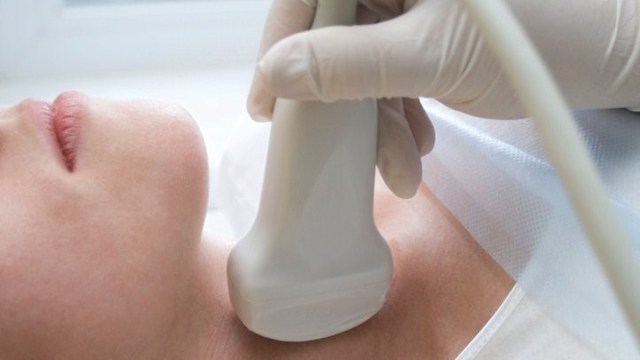1) Myth: Patients on thyroid medicines need cortisol to support the thyroid.

Via B-D-S/PhotoSpin
Fact: A very small percentage of people with autoimmune thyroid disease have Addison's disease or other reasons for adrenal insufficiency and need cortisol prior to starting thyroid medicines. Patients with symptoms of adrenal insufficiency (weight loss, nausea, vomiting, diarrhea, joint pain, abdominal pain) should be evaluated by an endocrinologist. Those without those symptoms can safely take thyroid medicine without taking cortisol.
2) Myth: Thyroid disease is easy to treat.

Via Auremar/PhotoSpin
Fact: For the lucky ones, thyroid disease is easily remedied with thyroid hormone. But for some people, blood tests don’t match how you feel. While your TSH may appear normal, you may have symptoms of hypothyroidism. Determining the dosage and type of treatment then, can be difficult and should be done under close supervision of a knowledge of an endocrinologist familiar with different thyroid preparations.
3) Myth- Armour thyroid is unreliable and its pills vary in potency depending on whether the pig has hyperthyroidism or hypothyroidism.

Via Dmitry Kalinovsky/PhotoSpin
Fact: The health status of the pig has nothing to do with the quality of the pills you take. Forest Pharmaceuticals, which makes Armour, has a rigorous quality control process that ensures that all lots are consistent.
4) Myth: You can use iodine instead of thyroid medication because it’s safer and more natural.

Via Wikipedia
Fact: Iodine can make hypothyroidism (and hyperthyroidism) worse and should not be taken as a supplement in patients without first discussing it with your endocrinologist. But the amount of iodine in salt or a multi-vitamin is low enough that it’s safe to take.
5) Myth: All patients with Hashimoto’s hypothyroidism need to be on a gluten-free diet.
Via Lev Dolgachov/PhotoSpin
Fact: Both celiac disease (in which one needs to be on a gluten-free diet) and Hashimoto’s hypothyroidism are autoimmune diseases and if you have Hashimoto’s hypothyroidism, you are more prone to getting celiac disease. Yet the overwhelming majority of patients with Hashimoto’s hypothyroidism do not have celiac disease and do not need to be on a gluten-free diet.
6) Myth: There is no need to measure a free or total T3 in patients treated with levothyroxine (L-T4) preparations for hypothyroidism.
Via Mardis Coers/PhotoSpin
Fact: A recent study found that about 15% of patients with hypothyroidism treated with L-T4 had low freeT3 levels even with a normal TSH. These patients may benefit from desiccated thyroid preparations or L-T4/L-T3 combination treatment.
7) Myth: All patients with hypothyroidism can safely be treated with once a day Armour thyroid.
Via MonkeyBusiness Images/PhotoSpin
Fact: Armour thyroid has both L-T4 and L-T3 (liothyronine) in it of which L-T3 has a short half-life and should be given twice a day. Otherwise patients will have low free T3 levels in the afternoon, evening and next morning before their dose. Armour thyroid has too much L-T3 and not enough L-T4, so some extra L-T4 is often needed for patients on Armour thyroid. For more information about Dr. Friedman’s practice or to schedule an appointment, go to www.goodhormonehealth.com.






Add a Comment6 Comments
It's so saddening for me to find that there are more helpful information about Hypothyroidism than Hyperthyroidism. Sometimes, the article would show "Hyperthyroidism" but what's actually in the article is all about Hypothyroidism. Like what the hell. Hyperthyroid patients needs information as well.
June 28, 2016 - 3:56amThis Comment
A proven scientific research diet & treatment that eliminates your hypothyroidism at the source !
Read here...
http://www.southseller.com/hypothyroidism-cure
July 18, 2015 - 10:04pmThis Comment
Absolutely do not add T4 meds to NDT like Armour. It will create a problem with Reverse T3, a by product of T4. High Reverse T3 levels "block" T3 from getting into the cells. I had RT3 of 26 and felt like death, lab range 8-25, it should be 8-10.
November 23, 2014 - 7:03pmThis Comment
The key word on myth #5 is ALL. A relatively small percentage of patients with Hashimoto's hypothyroidism have Celiac disease or gluten intolerance and should avoid gluten. However, most patients with Hashimoto's hypothyroidism have no problems with gluten and there is no reason they should avoid gluten. I did a careful Pubmed review of articles published on Hashimoto's hypothyroidism and gluten and there is no published studies on the issue.
I wish all patients good hormone health-Dr. Friedman
October 27, 2014 - 4:35pmThis Comment
I agree with the above comment - there's been some papers that have come out recently about the gluten-Hashimotos connection, wondering what your sources/citations are for #5? Many thanks! (interview on this very topic with Dr. Datis Kharrazian here if interested http://hypothyroidmom.com/gluten-why-hypothyroidism-patients-often-fail-to-get-better/)
October 27, 2014 - 11:08amThis Comment
We've had a lot of discussion going on on Facebook about number 5 on your fantastic article. Guess people feel they should be gluten free and it works for them. Can you give us more insight as to why that may or may not matter? Thanks!
October 13, 2014 - 10:47amThis Comment